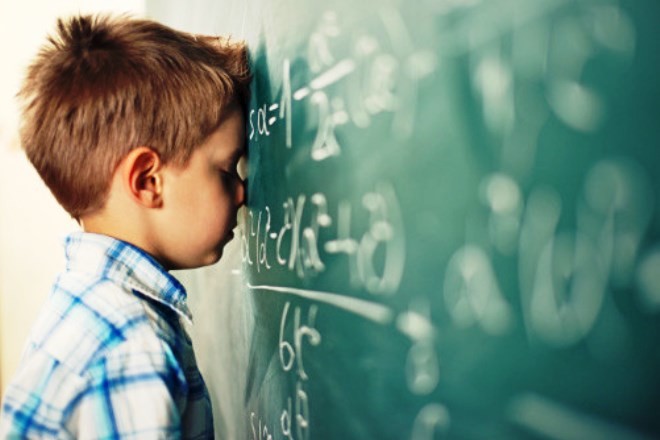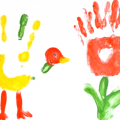- I can not anymore - 10-year-old Sasha is sufferingrolled her eyes and dropped her head on the notebook. The notebook was in a box. Mathematics. Yes, the queen of all sciences to children is often given more difficult than literature, history or other humanitarian knowledge. But without mathematics, nowhere. How to deal with it? Its method was invented by the British teacher Cathy Highgame, who spent ten years of her life trying to teach mathematics wisdom to other people's children. And when I encountered the same problem, but already in my own family (Katie has three children), I decided that I had to change something. And she created "Katie's Classroom" - a portal designed to help children and parents learn a complex science. A photo: GettyImages We have collected the top ten tips that Mrs. Highgam gives to the students and their parents. So, here they are. Talk to the teacher. Not once - when you meet. Regularly communicate with the teacher of mathematics. So you can understand what is hardest given to your child. And you can, let's say, address help. Paraphrasing Comrade Vladimir Ilyich, practice, practice and practice again. Especially if on the nose of the GIA or EGE. Solve several times the tasks from the collections, decide the examples from previous control or examinations of previous years. It sounds trite, but it really helps. When a child realizes that he is solving all these once difficult tasks without hesitation, he will become more confident. But it is from lack of confidence that children often make mistakes. Little by little, but often, every real woman knows: regularity is the key to solving any problem, whether it's cosmetic procedures, diet or sports. That's the same with mathematics. Even 15 minutes, but every day will help the child to cope with even the most cunning calculations. 4. Record and browse Let the child not only record the answer, solving the problem, even if it is correct. It is better if he will paint the entire decision process. Then, if he still makes a mistake, you can see where the failure happened. And to eliminate the problem on the spot. And if a small genius decides everything in his mind, to catch the moment when something went wrong, it will be much more difficult. Encourage or even praise. Small, even tiny prizes and praise will help your child to feel that he really achieved something. Mom's admiration, for example - you will not believe it, but it's really important. A little bit of boasting or even narcissism has not prevented anyone. In the end, the installation in the child's head "I can not, I can not do it" will be replaced by another, more useful: "I can not yet, but I will succeed." 6. Learn the multiplication table? Well yes. But it does not mean that it does not work. The speed of thinking, the speed of the reaction - all this can be perfectly trained, simply by flipping through the examples from the multiplication table. And it takes a little time. This game in the "burning numbers" can be done while spreading the bed in the evening, washing dishes, cleaning toys - yes, even for a walk.
A photo: GettyImages We have collected the top ten tips that Mrs. Highgam gives to the students and their parents. So, here they are. Talk to the teacher. Not once - when you meet. Regularly communicate with the teacher of mathematics. So you can understand what is hardest given to your child. And you can, let's say, address help. Paraphrasing Comrade Vladimir Ilyich, practice, practice and practice again. Especially if on the nose of the GIA or EGE. Solve several times the tasks from the collections, decide the examples from previous control or examinations of previous years. It sounds trite, but it really helps. When a child realizes that he is solving all these once difficult tasks without hesitation, he will become more confident. But it is from lack of confidence that children often make mistakes. Little by little, but often, every real woman knows: regularity is the key to solving any problem, whether it's cosmetic procedures, diet or sports. That's the same with mathematics. Even 15 minutes, but every day will help the child to cope with even the most cunning calculations. 4. Record and browse Let the child not only record the answer, solving the problem, even if it is correct. It is better if he will paint the entire decision process. Then, if he still makes a mistake, you can see where the failure happened. And to eliminate the problem on the spot. And if a small genius decides everything in his mind, to catch the moment when something went wrong, it will be much more difficult. Encourage or even praise. Small, even tiny prizes and praise will help your child to feel that he really achieved something. Mom's admiration, for example - you will not believe it, but it's really important. A little bit of boasting or even narcissism has not prevented anyone. In the end, the installation in the child's head "I can not, I can not do it" will be replaced by another, more useful: "I can not yet, but I will succeed." 6. Learn the multiplication table? Well yes. But it does not mean that it does not work. The speed of thinking, the speed of the reaction - all this can be perfectly trained, simply by flipping through the examples from the multiplication table. And it takes a little time. This game in the "burning numbers" can be done while spreading the bed in the evening, washing dishes, cleaning toys - yes, even for a walk. Photo: GettyImages7.Repetition is the mother of learningIf a new topic is too difficult, perhaps the problem is that your student has not yet mastered the previous one well enough. Go back a step or two, repeat old topics. And again move forward, from simple to complex.8. Get to the bottom of itLet all children be taught the same way, but they perceive information differently. Some seem to have the gift of spatial thinking from the cradle. And others need to visualize the problem in order to solve it. Maybe visual aids, pictures and other practices will help you? Try it.9. Let it become familiarMake a kind of math corner in your child's room: just like there are tables, diagrams and formulas hanging in the classroom, let them be here too. The more time he or she catches sight of all these wonderful things, the better he or she will remember them.10. Make mathematics closerAnd more familiar. If a child understands what place science occupies in our lives, it will be easier for him or her to come to terms with the fact that he or she needs to know it and to master various problems. For example, let him recalculate the amount of utilities based on the data from the receipts, calculate the travel time based on the bus schedule, the amount of change in the store, etc. Then it will become clear that we can’t do without mathematics. Read on:
Photo: GettyImages7.Repetition is the mother of learningIf a new topic is too difficult, perhaps the problem is that your student has not yet mastered the previous one well enough. Go back a step or two, repeat old topics. And again move forward, from simple to complex.8. Get to the bottom of itLet all children be taught the same way, but they perceive information differently. Some seem to have the gift of spatial thinking from the cradle. And others need to visualize the problem in order to solve it. Maybe visual aids, pictures and other practices will help you? Try it.9. Let it become familiarMake a kind of math corner in your child's room: just like there are tables, diagrams and formulas hanging in the classroom, let them be here too. The more time he or she catches sight of all these wonderful things, the better he or she will remember them.10. Make mathematics closerAnd more familiar. If a child understands what place science occupies in our lives, it will be easier for him or her to come to terms with the fact that he or she needs to know it and to master various problems. For example, let him recalculate the amount of utilities based on the data from the receipts, calculate the travel time based on the bus schedule, the amount of change in the store, etc. Then it will become clear that we can’t do without mathematics. Read on:

Making Money with Desserts: Success Stories
Evgeniya Polischuk (Fedutinova) instagram:@evgeniyafedutinovavk.com/janeshomebaking– It all started with baking for family and friends. Gradually, I started posting photos of my baked goods on Instagram – and orders started coming in. I made my first custom-made cake on October 13, 2014, and a little earlier I started making macaroons and cupcakes. You could say that the business “found me”, I am very […]

Soups are cold recipes with photos
Cold cucumber soup with yogurt and lemonsorbet from the chef of the restaurant La Taverna Alexander Zhurkin Photo: Getty Images Ingredients: Plain yoghurt – 125 g Cucumber – 150 g Lemon/lime sorbet – 50 g Cocktail shrimp – 24 g Fresh ginger juice – 1 g Lime juice – 5 g Fresh orange juice – 5 g Parsley – 1 g Pink pepper – 1 g Watercress – […]

barbeque kebab
Pork tenderloin in glaze Photo:Dmitry Bayrak/dbstudioPreparation time: 20 minutes + marinating time.Calories: 454 kcal per serving.For 4 servings: 4 pork tenderloins (approximately 300 g each), 1 onion, 2 cloves of garlic, 1 tsp. lemon zest, 1 tsp. lemon juice, a pinch of ground cumin, coriander and turmeric, 1 tbsp. vegetable […]

Pierre Duacan: dietary recipes: Ducane diet
Beetroot soup Photo:Season’S, Luxury Hotels RepresentationYou will need:· Boiled beetroot – 60 g· Fresh cucumbers – 20 g· Red radish – 20 g· Green onions – 10 g· Egg – 1 pc.· Drinking mineral water – 200 g· Salt – 1 gPreparation:· Boil the egg and beetroot.· Grate the cucumbers, radish and part of the beetroot. Put everything […]





